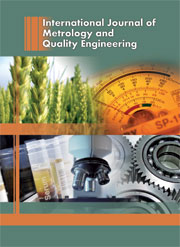Article contents
Determination of an adjusting rule in the case of multi-criteria inertial piloting
Published online by Cambridge University Press: 29 June 2011
Abstract
The weighted inertial piloting of processes presented in this paper is a break-away in terms of the quality of machined mechanical workpieces compared to the traditional piloting carried out by machine setters. However, sometimes one has a stability problem during the piloting phase due to over adjustment. We propose to study the causes of this instability and to develop an approach in order to correct the problems. Once we have reminded ourselves of the basics of weighted inertial tolerancing, we will propose an approach to identify the most probable decentring. The applications of the concepts discussed in this article were tested over a period of two months. The results are very convincing, especially with the elimination of the phenomenon previously observed in identical conditions.
Keywords
Information
- Type
- Research Article
- Information
- International Journal of Metrology and Quality Engineering , Volume 2 , Issue 1 , 2011 , pp. 51 - 59
- Copyright
- © EDP Sciences 2011
References
- 4
- Cited by

